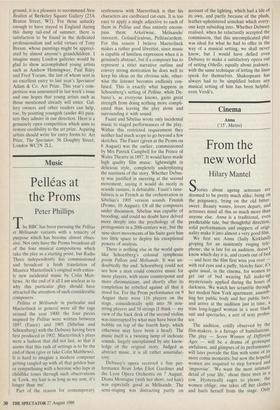Music
Pelleas at the Proms
Peter Phillips
The BBC has been pursuing the Pelleas et Milisande variants with a tenacity of purpose which has become almost obses- sive. Not only have the Proms broadcast all of the four musical compositions which take the play as a starting point, but Radio Three independently has commissioned and broadcast a fresh translation of Maurice Maeterlinck's original with entire- ly new incidental music by Colin Matt- hews. At the end of it all I am unclear as to why this particular play should have attracted the attention of such considerable composers.
Pelleas et Melisande in particular and Maeterlinck in general were all the rage around the year 1900: the four pieces inspired by Pelle:as were written between 1897 (Faure) and 1905 (Sibelius and Schoenberg) with the Debussy having been first produced in 1902. Maeterlinck's plays were a fashion that did not last, so that it seems that this rash of settings is to be the end of them (give or take Colin Matthews). It is hard to imagine a modern composer getting tangled up with all that golden hair or sympathising with a heroine who lisps in childlike tones through such observations as 'Look, my hair is as long as my arm, it's longer than me. restlessness with Maeterlinck is that his characters are cardboard cut-outs. It is too easy to apply a single adjective to each of them in Pelleas and thus entirely encom- pass them: Arkel/wise, Melisande/ innocent, Golaud/jealous, Pelleas/ardent. For this reason I believe Maeterlinck makes a rather good librettist, since music is capable of limitless expression when it is genuinely abstract, but if a composer has to represent a strict narrative outline and convey strong motivation he does well to keep his ideas on the obvious side, other- wise the listener becomes endlessly con- fused. This is exactly what happens in Schoenberg's setting of Pelleas, while De- bussy's, as everyone knows, gains great strength from doing nothing more compli- cated than leaving the play alone and surrounding it with sound.
Faure and Sibelius wrote only incidental music to staged performances of the play. Within this restricted requirement they neither had much scope to go beyond a few sketches. The Faure (given at the Proms on 8 August) was the earlier, commissioned by Mrs Patrick Campbell for the Prince of Wales Theatre in 1897. It would have made high quality film music: lightweight in delicious style, completely underplaying the nastiness of the story. Whether Debus- sy was justified in sneering at the second movement, saying it would do nicely in seaside casinos, is debatable. Faure's tune- fulness is as French as the orchestration in Sibelius's 1905 version sounds Finnish (Proms, 10 August). Of all the composers under discussion, Sibelius was capable of brooding, and could no doubt have delved more deeply into the psychology of the protagonists in a 20th-century. way, but the nine short movements of his Suite gave him too little space to deploy his exceptional powers of analysis.
There is nothing else in the world quite like Schoenberg's colossal symphonic poem Pelleas und Melisande. It was un- doubtedly the end. Schoenberg could not see how a man could conceive music for more players, with more counterpoint and more chromaticism, and shortly after its completion he rebelled against all that it stood for. For the Prom performance on 9 August there were 116 players on the stage, coincidentally split into 58 non- string players and 58 strings (I think — my view of the back desk of the second violins was interrupted by what may have been the bobble on top of the fourth harp, which otherwise may have been a head). The music itself is a twisting lump of inchoate sounds, largely unexplained by any know- ledge of the original story. Judged as abstract music, it is all rather unsatisfac- tory.
Debussy's opera received a fine per- formance from John Eliot Gardiner and the Lyon Opera Orchestra on 7 August. Diana Montague (with her short, red hair) was especially good as Melisande. The semi-staging was distracting partly on
account of the lighting, which had a life of its own, and partly because of the plush, leather-upholstered armchair which every- one kept subsiding into. Whether Debussy realised, when he reluctantly accepted the commission, that this uncomplicated play was ideal for what he had to offer in the way of a musical setting, we shall never know; but I would have defied even Debussy to make a satisfactory opera out of setting Othello, equally about jealousy, with the same technique of letting the lines speak for themselves. Shakespeare has always had to be simplified before any musical setting of him has been helpful, even Verdi's.














































 Previous page
Previous page